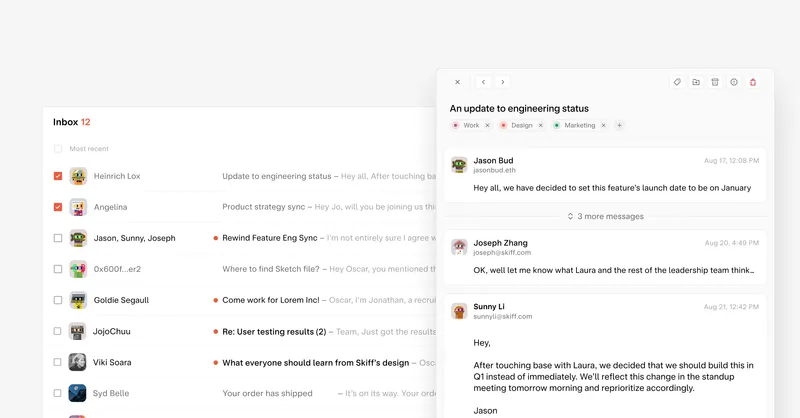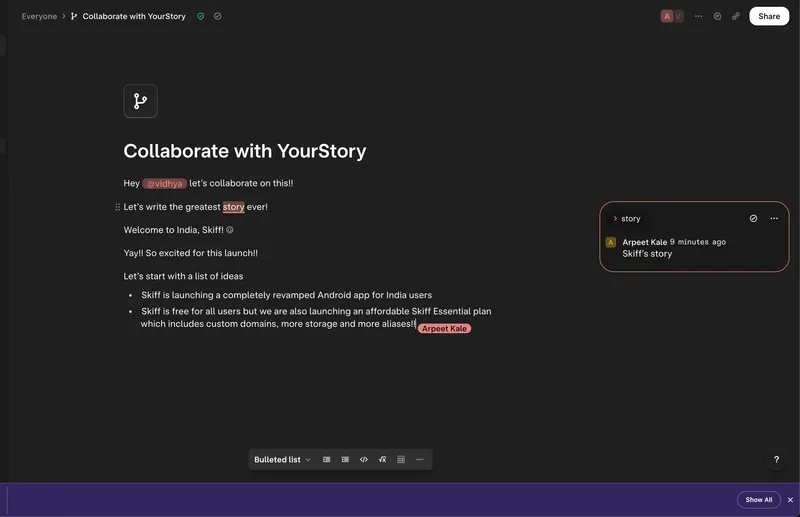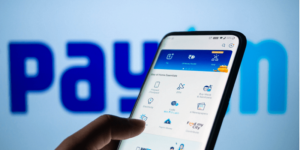On April 11, the government informed the Supreme Court it would table the Digital Personal Data Protection Bill 2022 during the Parliament’s Monsoon Session. The bill proposes to recognise individual privacy, and at the same time, it defines the scope of processing personal information for legal purposes.
For San Francisco, California-based Skiff, this development was particularly exciting. A privacy-respecting startup, Skiff offers an end-to-end encrypted email service and collaboration platform.
End-to-end encryption means nobody, including the service provider, can access user information on the platform.
The startup expects increasing awareness of data protection and privacy will make Indians gravitate towards companies such as theirs. In fact, Skiff is betting big on the possibilities this law could open up for its business as it expects India to be one of its biggest revenue contributors in the coming years.
Last week, the startup quietly launched its collaboration and productivity suite of applications for Android and Windows, specifically tailored for Indian users.
“There’s just a massive awakening around data protection data and privacy. India, in particular, in the last two years, has gone through a big kind of moment on that. That led us to build our suite of products,” says Andrew Milich, Co-founder and CEO of Skiff, in a virtual conversation with YourStory.

L to R: Co-founders of Skiff, Andrew Milich (CEO) and Jason Ginsberg (CTO)
Initial setup and traction
Founded by Stanford graduates Milich and Jason Ginsberg (Chief Technology Officer) in 2020, Skiff launched its first product Pages to write and collaborate on notes, documents, and wikis in 2021.
It was followed by Mail, Calendar, and Drive—all end-to-end encrypted, private, and launched in different months last year.
“We run our own SMTP (simple mail transfer protocol that enables sending and receiving mails) servers. We don’t use any third-party service for that. It allows us to further protect users’ data,” says Arpeet Kale, Head of Infrastructure and Founding Engineer of Skiff.
On Skiff, users do not need to part with any information—personal or otherwise—to sign up for its products. All they need to do is create an account with their username and password. The startup says it has no access to any users’ emails, documents, calendars, and files.
For example, tech giant Alphabet offers workspace and productivity tools. In 2018, it had around 1.5 billion Gmail users—the largest for any email service provider globally—but the company has come under criticism for snooping on its users and selling their information to advertisers on more than one occasion.
Besides, its list of competitors also includes end-to-end encrypted email provider ProtonMail and Zoho Mail by the Chennai-based software firm of the same name Zoho.
Skiff offers workspace collaboration, which ProtonMail lacks, and end-to-end encryption by default without any setup, which Zoho doesn’t provide. Instead, it offers some elements of encryption integration depending on user setup.
“So, we have software companies, media companies, journalists, writers, authors, researchers, crypto companies, etc., who value that kind of level of control over their data. It’s a lot about peace of mind,” says Milich.
The startup has made it easier to import one’s email account from Google, Outlook, and ProtonMail. In a two-step process, one can download all folders—notes, documents, and files from Google Drive—and upload them on Skiff’s Drive.
Additionally, Skiff has a Web3 component incorporated into its suite of products. “Our storage is decentralised. Users have the option to store all the data on decentralised storage and not even on our servers,” says Kale.
“Even if Skiff ceases to exist, you could still go, use the same key, decrypt the data, and download it locally if you wanted to,” he adds.
Further, the startup has wallet integrations with MetaMask and Brave Wallet, enabling users to sign into its suite of products through the platforms of the latter “to have complete privacy, ownership, and the ability to claim an identity that’s uniquely theirs”, according to one of Skiff’s blog posts.
It has partnered with Coinbase Commerce, which allows businesses to accept payments in various cryptocurrencies to create a privacy-respecting crypto-payment system. Skiff users can make purchases using a wallet of their choice or by using their Coinbase account, which provides additional protection and helps reduce their digital footprint.

Screenshot of Skiff Mail
Why India?
From the beginning, Skiff was building for iOS users, given that Apple’s mobile operating system dominates in the United States.
As it looked to lay down its strategy for its next wave of growth between December 2022 and January this year, Skiff realised it received the second-highest traffic from Indian and European users—about 10% each.
Of its 650,000 users, Skiff sees 53% Windows users and 18% Android users, while iOS users represent 11% of the total user base.
“The realisation was that since everyone is entitled to privacy, we have to meet people where they are, and Windows/Android are obviously more relevant in the Indian context,” explains Milich.
Keeping the Indian user in mind, half of Skiff’s 20-member team, of which 15 are full-time employees, started building Android and Windows apps with specific tweaks.
These include infrastructure changes to reduce app-load time and a new user interface. It also tweaked its offline support, where one can read their existing emails and send calendar invites without connecting to the Internet. Also, these would be globally available, too.
“Building an app takes four to five months, and when we decide to rebuild an app, it’s a big commitment. It’s almost like it has to succeed for the company to survive. So, we made a really big bet that we need to rebuild the app to succeed in India and, hopefully, in some of our lower down traffic countries in the future,” says Milich.
For its India launch, Skiff has set aside around $500,000 to invest over the next six months, including social media campaigns and marketing expenses in India.
Support in some of the major Indian languages is on Skiff’s product roadmap. The company intends to register an entity in India and hire a team in a couple of years, depending on the traction it receives from users.
For now, it is betting big on major Indian cities to adopt its workspace product suite, hoping the awareness about data protection and privacy would catch up with the rest over time.
It expects to add at least five million users—around one to two million just from India—over the next two to three years. While Indian users account for about 10% of the startup’s total users, the team hopes to double it by next year.

Screenshot of Skiff Pages (to write and collaborate on notes, documents, and wikis)
What’s next?
The California-based startup has raised $23 million in two funding rounds from investors, including Sequoia Capital, Neo, Ethereum Foundation, and angels such as John Lilly (former CEO, Mozilla) and Balaji Srinivasan (former CTO, Coinbase).
Milich says most of the money still lies unspent, largely due to Skiff’s low cost of operations. It will be invested in better product capabilities, including adding advanced features Google Workspace users are familiar with and some aimed at enterprise users (think: direct competition to Google Workspace) and, simply, furthering the idea of user privacy.
With the product-led approach, Skiff is heavily investing in making the user experience smooth and social media campaigns to gather feedback and understand its users better. Besides, it is laying the groundwork for “good customer service to respond to people to help them have a good experience”.
Also, the team relies on referrals as a channel, offering $10 for downloading its apps for Android/iOS or if a friend signs up based on the referral codes and $15 for importing files from Google Drive.
Skiff hopes to woo individual users in the first leg of its go-to-market strategy, expecting businesses to follow suit. Once it hits a million users, it plans to go aggressive with the business segment.
Milich says Skiff’s pricing plans, rolled out last October-November, are similar to Google and Outlook’s workspace suite of products.
With ambitious goals of growing at least 3-4X in the next 12-18 months, the startup hopes to have “a few million sign-ups” and cross the five-million threshold in 2-3 years. And, in this journey, India is the kingpin for the startup.



![Read more about the article [Funding roundup] Falca, BimaKavach, TurboHire raise millions in early-stage deals](https://blog.digitalsevaa.com/wp-content/uploads/2022/01/VCfunding-1605087354569-300x150.jpg)




![Read more about the article [Startup Bharat] From handwoven pashmina to carpets, this Srinagar-based D2C startup aims to promote Kashmir’s handloom globally](https://blog.digitalsevaa.com/wp-content/uploads/2022/02/ATK1-1643793527662-300x150.png)

